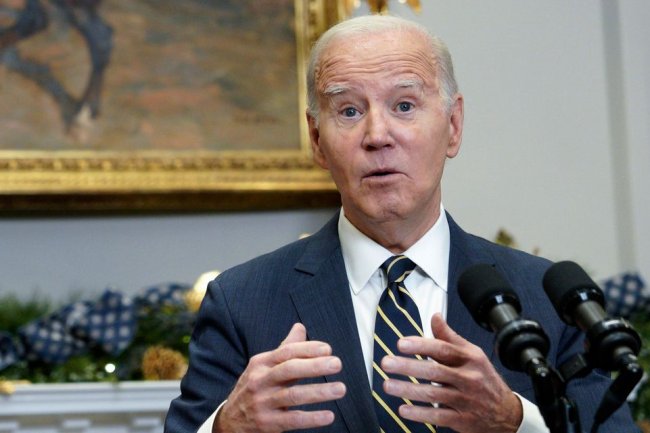Everybody Hates Mitch McConnell
His unpopularity—for his effectiveness and being willing to compromise—is a grim sign of the times. By Andy Laperriere Aug. 7, 2023 6:02 pm ET Mitch McConnell speaks in Fancy Farm, Ky., Aug. 5. Photo: Ryan C. Hermens/Lexington Herald-Leader/Associated Press It has been an eventful and depressing few weeks. Donald Trump was indicted again. Hunter Biden’s outrageous plea agreement blew up. Some Democrats now admit President Biden was probably involved in Hunter’s business dealings. And Fitch downgraded U.S. government debt. But my thoughts keep going back to when Senate Minority Leader Mitch McConnell froze before the cameras. Mr. McConnell is by far the least popular political leader in America. It isn’t even close. The RealClearPolitics average shows Mr. McConnell’s net unf


Mitch McConnell speaks in Fancy Farm, Ky., Aug. 5.
Photo: Ryan C. Hermens/Lexington Herald-Leader/Associated Press
It has been an eventful and depressing few weeks. Donald Trump was indicted again. Hunter Biden’s outrageous plea agreement blew up. Some Democrats now admit President Biden was probably involved in Hunter’s business dealings. And Fitch downgraded U.S. government debt. But my thoughts keep going back to when Senate Minority Leader Mitch McConnell froze before the cameras.
Mr. McConnell is by far the least popular political leader in America. It isn’t even close. The RealClearPolitics average shows Mr. McConnell’s net unfavorability rating is nearly twice as bad as his nearest competitor. Most activist Republicans loathe Mr. McConnell because the conservative media attacks him mercilessly for being a “Republican in name only”—a RINO. Democrats detest him because they believe he is a rabid (and extremely effective) partisan.
But sometimes politicians are unpopular for the right reasons. Of all the people listed in the nearby table, Mr. McConnell alone never questioned the legitimacy of the 2016 election, never questioned the legitimacy of the 2020 election, never peddled the Russia-collusion hoax, and unequivocally condemned the violent Jan 6. attack on the Capitol.
It now appears age is catching up to Mr. McConnell, 81. He had his episode before the cameras two weeks ago, and it has been reported he has fallen multiple times since suffering a concussion and broken ribs this past winter.
Mr. McConnell built the Republican Party in Kentucky from the ground up. He recently broke the record for the longest-serving party leader in the Senate, eclipsing Sen. Mike Mansfield’s 16 years. He has been the most effective Republican in Washington since Ronald Reagan and the most effective senator since Ted Kennedy.
Some say he is too partisan. That may be fair. Some say he should have criticized Mr. Trump more often. Maybe so, but part of surviving in politics is avoiding self-immolation. He is attacked mercilessly by much of the conservative media because he is willing to lead and govern, and that means agreeing to unpleasant compromises. His even greater offense is that he has standards.
When I first started covering Washington for investors, many clients would ask if following all those politicians around drove me crazy. I used to say they aren’t as bad as you think—and that was true. In those days, Rep. Henry Hyde used to tell House freshmen that some causes are worth losing an election for. Mr. McConnell believes that. When he entered the Senate in 1985, plenty of his colleagues did too.
Things are different now. The tenor of the political debate has changed, the media has changed, and the American people have changed. Garry Kasparov once observed: “The point of modern propaganda isn’t only to misinform or push an agenda. It is to exhaust your critical thinking, to annihilate the truth.” Unfortunately, we are in a post-truth era in American politics.
This was evident in the response to damning testimony last week that then-Vice President Biden was on the phone countless times with Hunter’s foreign business clients. Rep. Daniel Goldman (D., N.Y.) says Hunter sold the “illusion of access” because Joe Biden
didn’t do anything for Hunter’s clients. Getting the American vice president on the phone is the very definition of “access.”Even accepting Mr. Goldman’s defense at face value, he is at the very least saying Hunter was a con man who provided no real value. At worst he is acknowledging that the vice president was an active participant in a scheme to bilk foreign companies out of tens of millions of dollars. How is it that no prominent Democrat has risen to condemn this alleged influence peddling scandal? It seems most Democratic voters are immune to whatever the truth may be.
What about Republicans? In a recent New York Times/Siena poll, 56% of GOP voters surveyed said Mr. Trump didn’t do anything wrong in the classified-materials case. As for his actions after the 2020 election, 75% of GOP voters agreed “he was just exercising his right to contest the election” while only 19% thought “he went so far that he threatened American democracy.” It’s no wonder Republican elected officials, including Mr. Trump’s primary opponents, sound as preposterous defending him as Mr. Goldman does defending Mr. Biden.
Neither Mr. Biden nor Mr. Trump are likely to take the political risks necessary to tackle tough and controversial problems. Fitch was right to downgrade the U.S. debt and probably underappreciates the rot in America’s political system.
Even the old standards for evaluating a president—integrity, competence, experience—seem antiquated. Partisans in both parties want their leaders to put tribe over truth. Until that changes, Mitch McConnell will remain the least popular political leader in America.
Mr. Laperriere is head of U.S. policy for Piper Sandler & Co., an investment bank.
Review and Outlook: Special counsel Jack Smith's latest indictment is based on a broad and novel theory of fraud against the U.S. and serves the Democratic goal of making the 2024 election a referendum on Jan. 6, 2021. Images: Jane Rosenberg/Reuters/AP Composite: Mark Kelly The Wall Street Journal Interactive Edition
What's Your Reaction?













